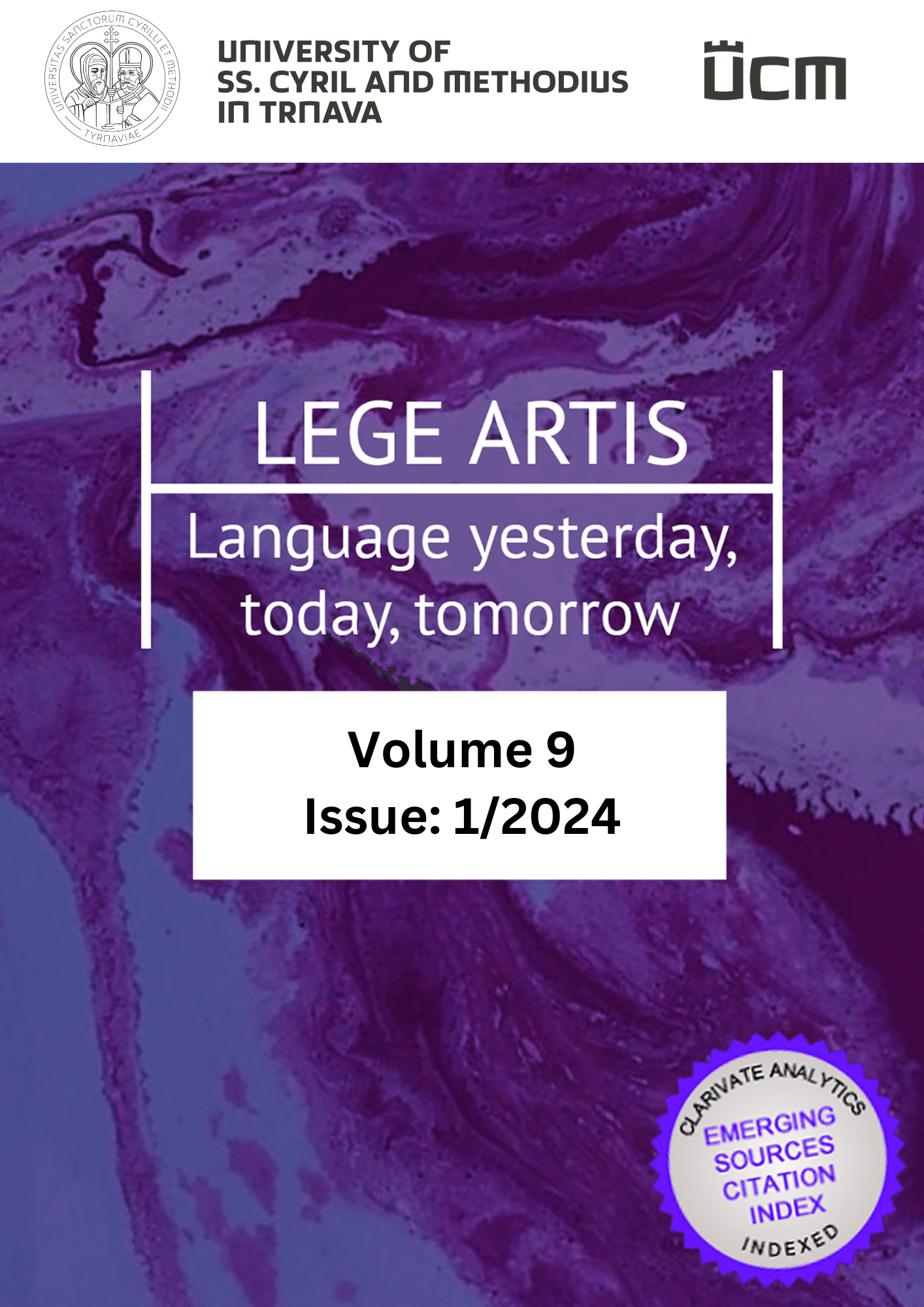LEGE ARTIS
Language yesterday, today, tomorrow
Category: Issues
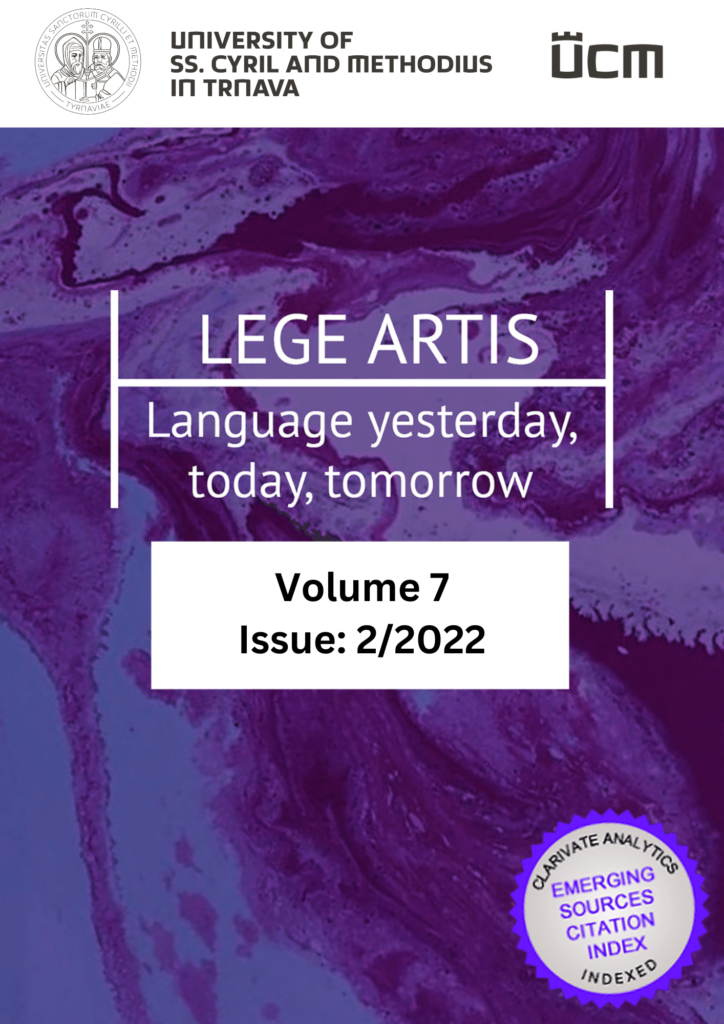
Contents
| FIGURATIVE CREATIVITY IN AVIATION SLANG: THE CASE STUDY OF COMPOUNDS DENOTING ‘AIRLINE PASSENGERS’ Beata Kopecka, Piotr Mamet |
| THE will AND be going to CONSTRUCTIONS AS PANCHRONIC INFERENCES: IN SEARCH OF COGNITIVE MOTIVATION Przemysław Łozowski |
| SLOGANS IN ENGLISH AND SLOVAK ADVERTISEMENTS: STYLISTIC ASPECT Halyna Stashko, Ľudmila Čábyová, Vladimíra Jurišová |
| METAPHORS DESCRIBING AMERICA IN OBAMA’S FIRST PRESIDENTIAL CAMPAIGN – A CASE STUDY OF THE PRESIDENTIAL MEMOIR A PROMISED LAND Agnieszka Uberman |
| BIDIRECTIONALITY OF METONYMIZATION OF ENGLISH ‘CLOTHES’ VOCABULARY: A SOCIOLINGUISTIC PERSPECTIVE ON SEMANTIC DIACHRONY Angelina Żyśko, Konrad Żyśko |
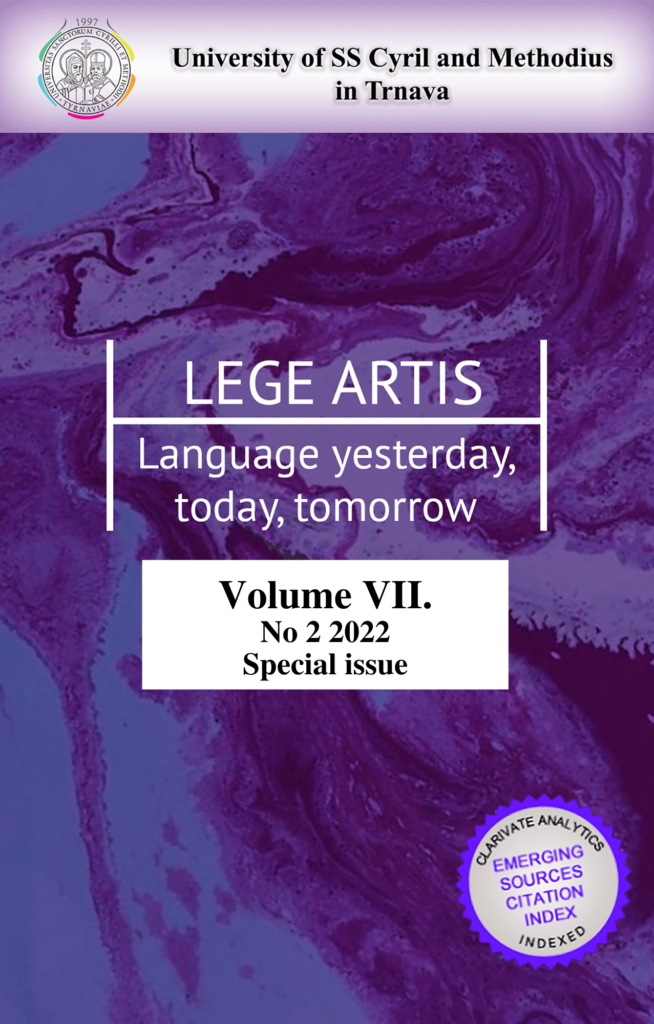
Contents
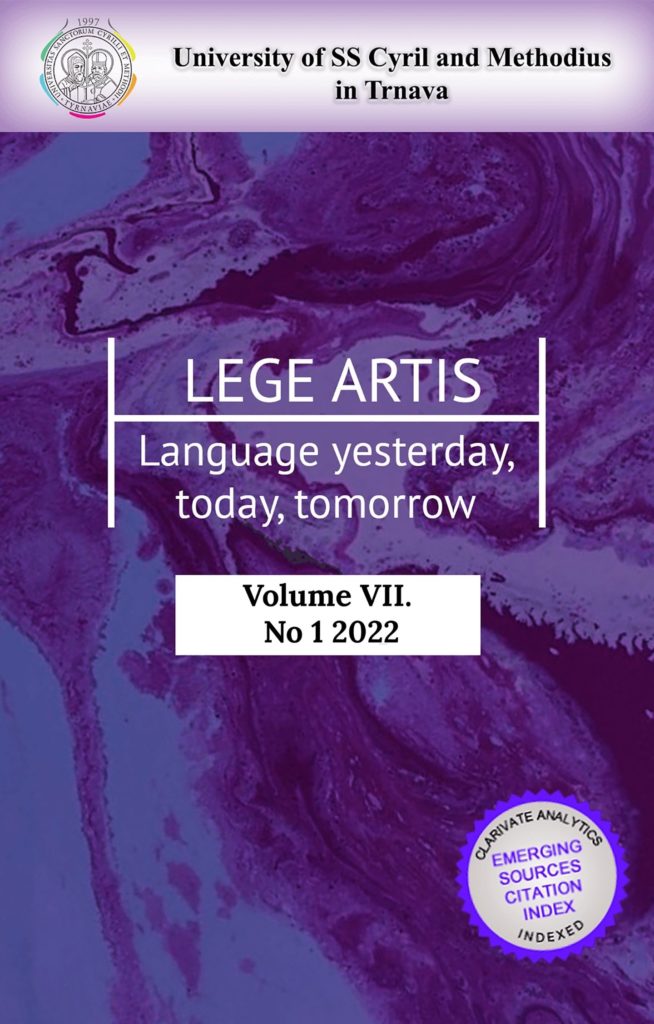
Contents
| LIKE A BAD DREAM: NAVIGATING NARRATIVE SPACES OF PANDEMIC-THEMED DREAM REPORTS Ievgeniia Bondarenko, Valeriia Nikolaienko |
| METALINGUISTIC SIGNIFICANCE OF BASIC ITALIAN ONOMASTIC TERMINOLOGY: A CORPUS-BASED STUDY Artur Gałkowski |
| TOWARDS AN ECO-FRIENDLY FUTURE: A CORPUS-BASED ANALYSIS OF MEDIA DISCOURSE ON “SAUDI GREEN INITIATIVE” Ansa Hameed, Ismat Jabeen, Naeem Afzal |
| METAPHORICAL LEXICAL BLENDS RELATED TO BREXIT: COGNITIVE PROCESSES OF MEANING CONSTRUCTION AND DISCURSIVE EFFECTS Joanna Jabłońska-Hood, Ewelina Prażmo |
| SYNTHETIC AND ANALYTIC ADJECTIVE NEGATION IN ENGLISH SCIENTIFIC JOURNAL ARTICLES: A DIACHRONIC PERSPECTIVE Katrin Menzel, Marie-Pauline Krielke, Stefania Degaetano-Ortlieb |
| STUDYING THE IMAGE-SYMBOL LABYRINTH: A MYSTERY? A POSSIBLE ROUTE? OR A TRIAL? Svitlana Volkova, Daria Stetsenko |
| CONSTRUCTION PRAGMATICS: A BRIEF SKETCH Xu Wen |
| AUDIOBRANDING IN AMERICAN AND SLOVAK TELECOMMUNICATIONS ADVERTISING: A LINGUISTIC STANDPOINT Inna Zabuzhanska, Matej Martovič, Marija Hekelj |
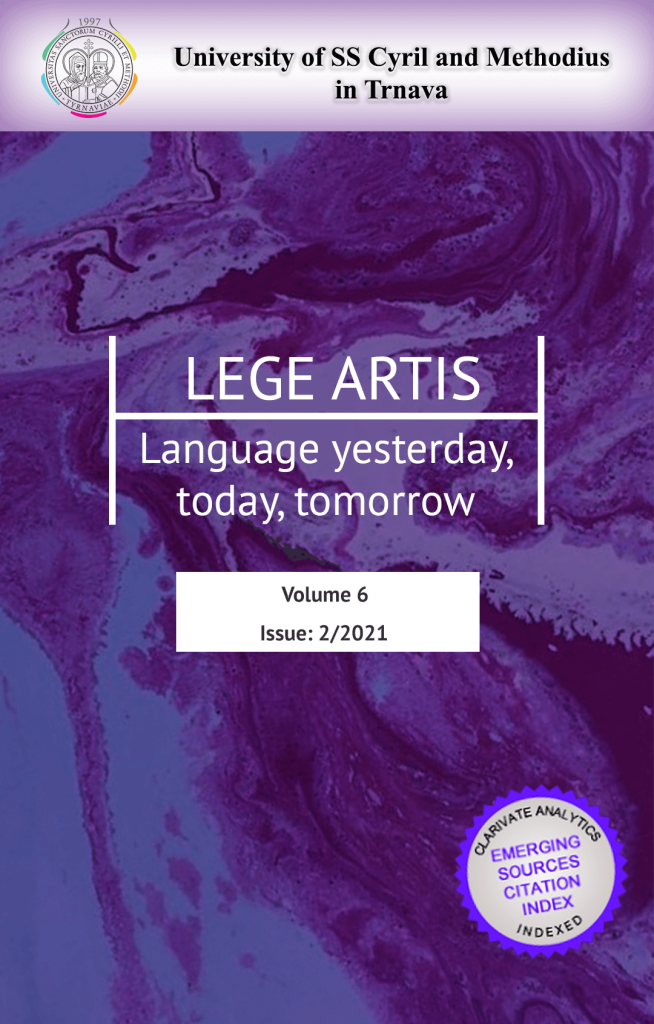
Contents
| APPROACHING “THE END”: METAPHORS OF OLD AGE IN THE LITERARY DISCOURSE
Snizhana Holyk |
| 1920 VS 2020 ENGLISH NEOLOGISMS: A CASE STUDY OF CONTRASTIVE SEMANTICS
Michaela Hroteková, Daniel Lančarič, Peter Bojo |
| THE EQUIVALENCE OF TERMS DENOTING THE EMOTION CONCEPTS OF GER. ANGST AND A.-S. FEAR: A CORPUS-BASED METHOD
Kostiantyn Mizin, Liudmyla Slavova, Viktoriia Khmara |
| TOXICITY PHENOMENON IN GERMAN AND SLOVAK MEDIA: CONTRASTIVE PERSPECTIVE
Nataliya Petlyuchenko, Dana Petranová, Halyna Stashko, Nataliya Panasenko |
| COGNITIVE RHETORIC OF EFFECT: RESPONSIBILITY IMPRESSION IN RUSSIAN AND UKRAINIAN PRESIDENTS’ INAUGURALS
Serhiy Potapenko, Natalya Izotova |
| SELECTED FEMALE KINSHIP TERMS IN POLISH, ENGLISH, AND CHINESE: A CONTRASTIVE PERSPECTIVE
Agnieszka Uberman, Zuzanna Uberman |
| RHETORICAL PROSODY IN ENGLISH POLITICAL DISCOURSE Roman Vasko, Oksana Aleksiievets |

Contents
| VERBAL DUEL AND FLIRTATION FROM A COGNITIVE PERSPECTIVE: A CASE STUDY OF FILM NOIR “THE BIG SLEEP” (1946)
Agnieszka Grząśko, Robert Kiełtyka |
| FROM SPATIAL MARKING TO DEGREE MODIFICATION: A CORPUS-BASED STUDY OF THE POLISH DALEKI OD (FAR.ADJ FROM) X AND DALEKO OD (FAR.ADV FROM) X CONSTRUCTIONS
Damian Herda |
| CYCLICAL TIME IN FAIRY TALE AND RAP LYRICS: POINTS OF INTERSECTION
Nataliia Kravchenko, Marianna Goltsova, Valentyna Snitsar |
| ANIMACY AND OTHER DETERMINANTS OF GENITIVE VARIATION IN SWEDISH: S-GENITIVE VS. PREPOSITIONAL CONSTRUCTION
Alicja Piotrowska |
| ERGA OMNES: METAPHORS AND CONSUMERIST IDEOLOGY
Fabio I.M. Poppi, Eduardo Urios-Aparisi |
| SLAVIC AND GERMANIC REFLEXES OF PROTO-INDO-EUROPEAN ROOT *H2UEH1- ‘WIND’: A COMPARATIVE STUDY
Mikołaj Rychło |
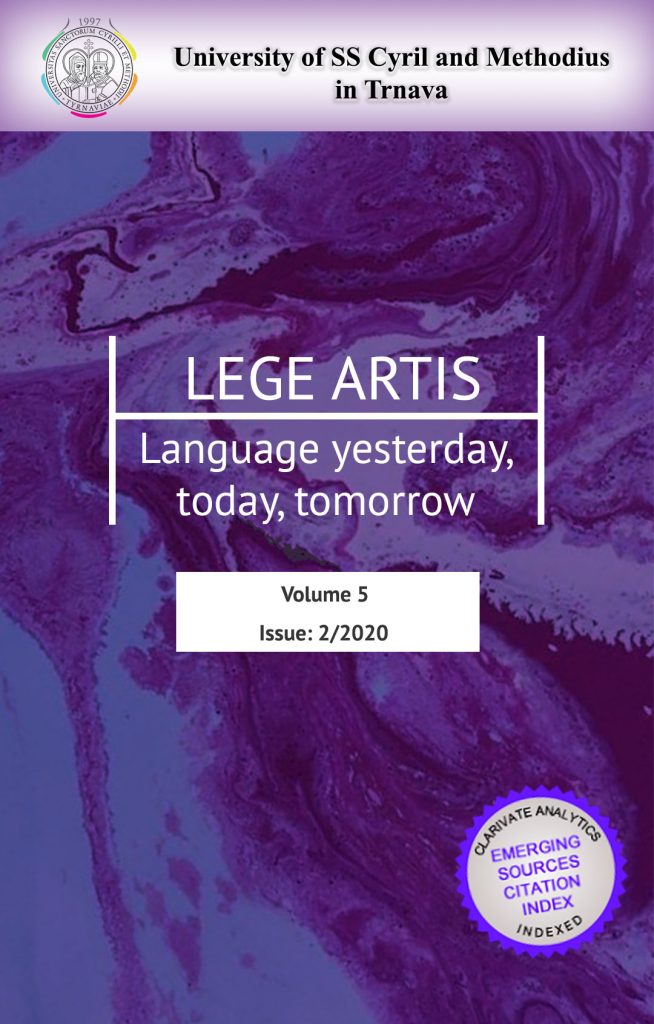
Contents
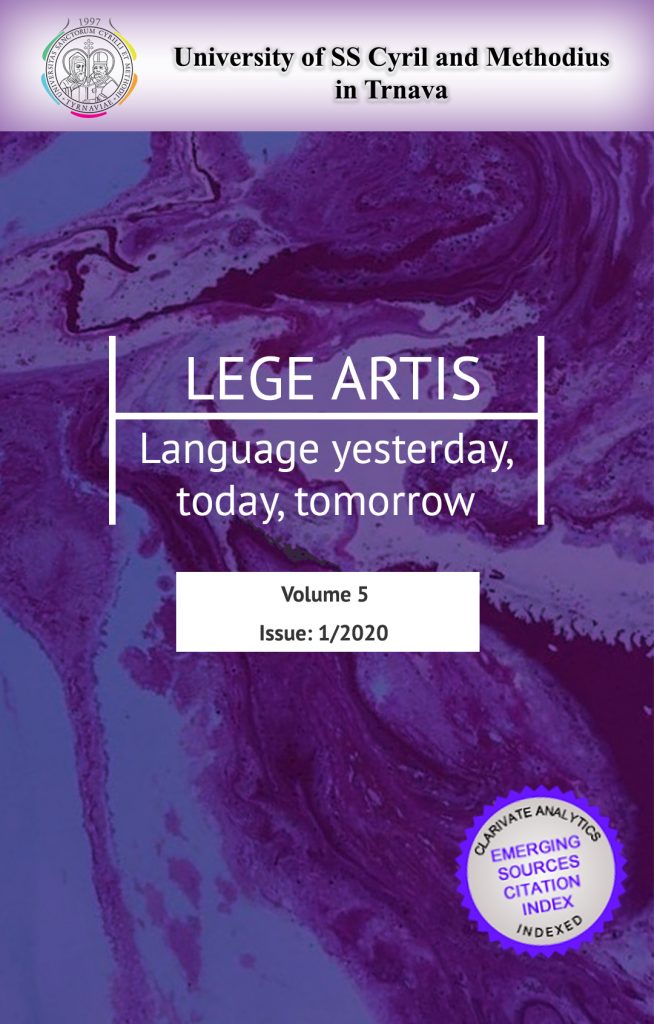
Contents
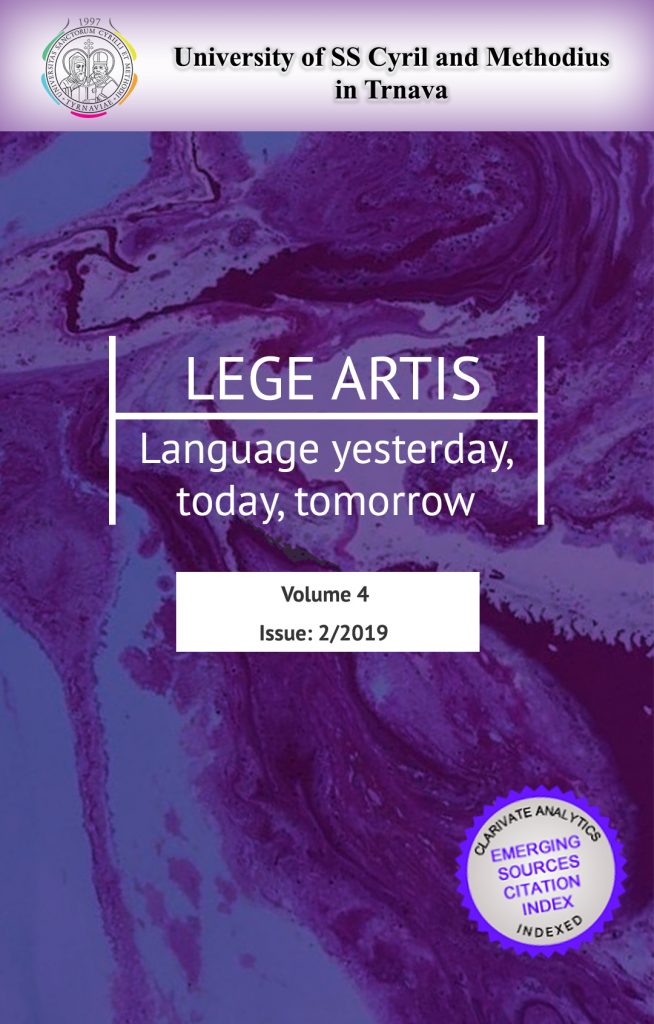
Contents
| PRAGMATIC PECULIARITIES OF THE FINAL PHASE OF CONFLICT INTERACTION IN FICTION DISCOURSE
Olha Chernenko |
| THE IMAGINARY: FROM GENRE THROUGH TEXT AND LANGUAGE TO CONCEPTUAL SPACE (BASED ON J.R.R. TOLKIEN’S LITERARY WORKS)
Nataliia Chetova |
| CONCEPTUAL METAPHORS OF TIME IN ENGLISH: AN AXIOLOGICAL PERSPECTIVE
Mariia Konnova, Natalia Babenko |
| TWITTER-BASED MULTIMODAL METAPHORICAL MEMES PORTRAYING DONALD TRUMP
Alla Martynyuk, Olga Meleshchenko |
| COGNITIVE MAPPING OF THE CONTEMPORARY GERMAN MATRIMONIAL CONFRONTATIONAL DISCOURSE
Iryna Osovska, Liudmyla Tomniuk |
| AFFECTIVE-DISCURSIVE PRACTICES OF ANGER AND INDIGNATION IN THE SUSTAINABILITY OF VICTORIAN IDEOLOGY
Iryna Pinich |
| URBAN TOPONYMY AND COLLECTIVE MEMORY: A CASE OF LAW-ENFORCED DECOMMUNIZATION OF STREET NAMES IN POLAND
Mariusz Rutkowski |
| A COGNITIVE-PRAGMATIC PERSPECTIVE ON APOLOGIES IN ENGLISH AND UKRAINIAN DISCOURSE
Iryna Shevchenko, Volodymyr Gutorov |
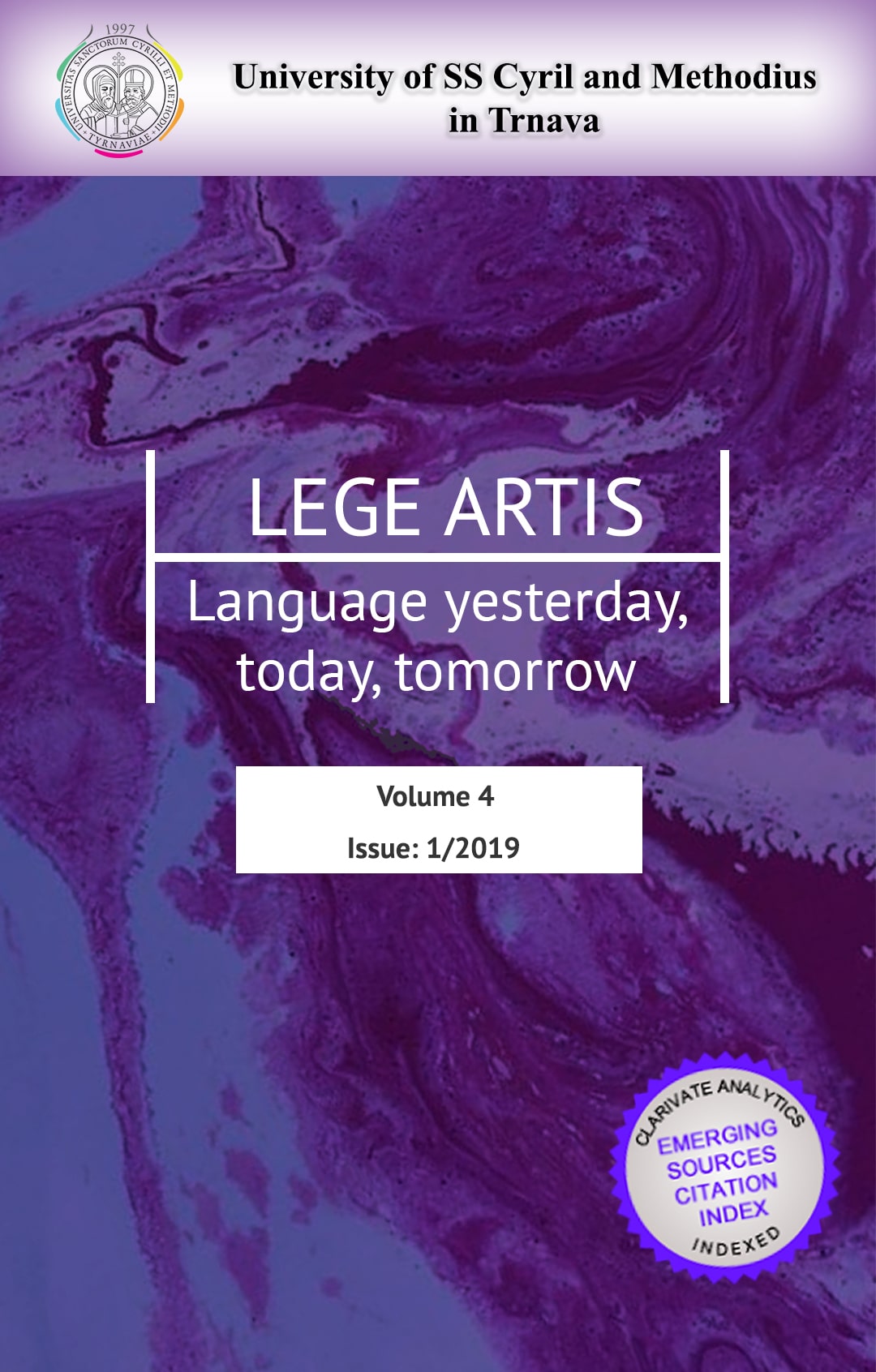
Contents
| COGNITIVE PRAGMATIC REGULARITIES IN COMMUNICATIVE MANIFESTATION OF POSITIVE EVALUATION
Natalia Bigunova |
| GENDER-SPECIFIC EMOTIVITY OF VICTORIAN FEMALE PROSE FROM A MULTIDIMENSIONAL PERSPECTIVE
Vera Nikonova, Yana Boyko |
| CHARISMA AND FEMALE EXPRESSIVENESS: LANGUAGE, ETHNOCULTURE, POLITICS Natalia Petlyuchenko, Valeria Chernyakova |
| MARKETING TERMINOLOGY THESAURUS: THE COMPETITION SEGMENT
Olena Radchenko |
| CONCEPTUALISING THE MENTAL SPHERE IN DISCOURSE: FROM ENLIGHTENMENT PHILOSOPHY TO MARK TWAIN
Anastasia Sharapkova, Evgeny Loginov, Larissa Manerko |
| INNER CIRCLES, GOODNESS, AND LIES IN “A WORD CHILD” BY IRIS MURDOCH: A COGNITIVE FACET OF LITERARY ANALYSIS
Liliia Tereshchenko, Tetiana Tkachuk |
| FROM CORPUS-ASSISTED TO CORPUS-DRIVEN NSM EXPLICATIONS: THE CASE OF FINNISH VIHA (ANGER, HATE) Heli Tissari, Ulla Vanhatalo, Mari Siiroinen |
| A COMPARATIVE STUDY OF THE FRAME OF KNOWLEDGE IN ENGLISH AND POLISH: PRELIMINARIES
Agnieszka Uberman |
Contents
| FANTASY WORD SOUNDING IN MARKETING PHONOSEMANTICS
Maria Danilchuk |
| MYSTERIOUS FEARS: LEXICAL MEANS OF EXPRESSING THE CONCEPTUAL CATEGORY THE MYSTIC IN THE ENGLISH GOTHIC NARRATION OF THE 18TH CENTURY
Oksana Halych |
| ACADEMIC AND LITERARY COMMUNICATION: ADDRESSABILITY, STATUSES, AND FUNCTIONING
Irina Kolegaeva, Lesia Strochenko |
| A CONTRASTIVE ANALYSIS OF PERSIAN AND ENGLISH VOWELS AND CONSONANTS
Hamzeh Moradi, Jianbo Chen |
| CONFLICT, CONFRONTATION, AND WAR REFLECTED IN MASS MEDIA: SEMANTIC WARS, THEIR VICTORS AND VICTIMS
Nataliya Panasenko, Ľuboš Greguš, Inna Zabuzhanska |
| FRAME MODELING OF THE CONCEPTS OF LIFE AND DEATH IN THE ENGLISH GOTHIC WORLDVIEW
Anna Prihodko, Oleksandra Prykhodchenko |
| SPEECH ACT OF THREAT IN EVERYDAY CONFLICT DISCOURSE: PRODUCTION AND PERCEPTION
Nikita Probst, Tatiana Shkapenko, Arina Tkachenko, Alexey Chernyakov |
| INDIVIDUAL SPEECH BEHAVIOUR OF RUSSIAN-SPEAKING PROSECUTORS IN THE 19-20TH CENTURIES: A CASE STUDY IN IMPLICIT PRAGMATICS
Marina Zheltukhina, Irina Zyubina |
Contents
Contents

Dear readers,
I am glad to present you a Special issue of “Lege artis. Language yesterday, today, tomorrow”. What makes it special? You will see that all the authors are from the same university – Kyiv National Linguistic University, Ukraine. Now our journal has readers from 51 countries representing 5 continents; we have been registered in 17 databases, thus it is a very good chance for any university to represent its young teachers as well as different linguistic schools headed by outstanding scholars. I hope this very good example will have many followers in future.
This special issue is very large in volume and has resulted thanks to the joint efforts of many people. I want to thank our anonymous reviewers coming from Azerbaijan, Germany, Malaysia, Poland, Russia, Slovakia, and Ukraine, as well as the members of the editorial board, who have found time to make thorough reviewing of the papers making valuable critical remarks. In my first Editor’s note I have named the champions of editing. It’s my pleasure to thank these people once again. My thanks go to Résumé editors Ad Foolen and Daniel Lančarič who have also edited articles. The quality of the paper depends on the work of our Language editors and I am very happy that Iryna Pinich and Michael Valek are the members of our team. Only authors know the volume of work done by our Managing editors. Dear Halyna Stashko and Inna Zabuzhanska, you are second to none! The authors will remember for a long time (if not for good) their papers marked by you in different colours highlighting wrong commas and inverted commas, and small and capital letters, and invalid Internet links, etc. It was not easy to organize teachers from different chairs to send their papers in time and to prepare everything properly for the issuing of our journal. I will always remember great encouragement given to me by Dana Petranová, Tatiana Podmaková, Roman Vasko, Michal Kabát, Johny Domanský, Lidiya Volkova and Iryna Pinich who takes the floor after me with her introductory part of our journal.
Editor-in-Chief
Nataliya Panasenko
Introduction

Modern trends in linguistics have served as a trigger for the assembling and pondering over relevant linguistic matters from a multi-vector perspective.
The current issue is a collection of articles based on the original research of the Departments (and the Scientific and Research Centers) of Kyiv National Linguistic University, Ukraine. The scientific interests of the researchers are broad in the areas of Phonetics and Phonology, Discourse and Discourse Analysis, Pragmatics, Text Linguistics and Stylistics, Communicative and Cognitive Linguistics.
The idea of bringing the representatives of various schools of linguistic thought together within the issue had a number of incentives. Primarily, the research findings are rallied around the vision of an always-on breakthrough approach. The current endeavour to investigate into the nature and nurture of language gives a significant impetus in bringing the processes under the disguise into the forefront of linguistic concerns. The processing and crystallization of meaning, its constructing and inferencing are among other foci that serve as a starting point for the subsequent linguistic studies.
Secondly, the valued input of every contributor is a successful attempt at shifting from a fixed mindset to a growth mindset. The individual inspiration of the University Professors brings out the best in the inter-faculty activities and increases the array of linguistic studies at the University. The conduct of groundbreaking research and research supervision add to the hallmark of the University. The articles exhibit the consistent and continuous work in the fields of the scholars’ interests that accumulated a vast amount of research results and make the scientific heritage of the University.
And finally, the inclusiveness principle serves an effective way for cultivating the momentum of further studies both within the University and beyond its walls. The research findings of the University Professors alongside the talented candidates’ contribution present the issues that might be attractive to the public at large and can be implemented in various aspects of social life.
Iryna Pinich,
Kyiv National Linguistic University,
Ukraine
Contents
Contents
SPEAKING TO THE GLOBAL AUDIENCE: A CASE STUDY INTO THE MESSAGE TRANSFORMATION
Yaroslava Fedoriv
MEANING-MAKING PROCESSES IN DERIVATIVES FROM PRECEDENT NAMES
Ekaterina Golubkova, Anastasia Zakharova
LANGUAGE WORLDVIEW OF YAKIMA INDIANS, COMPARED WITH ENGLISH AND UKRAINIANS
Andrej Levitsky
TOWARDS UNDERSTANDING OF CONCEPTUALISATION IN COGNITIVE TERMINOLOGY
Larissa Manerko
DEATH IN METAPHORICAL LANGUAGE
Agnieszka Uberman
TEMPORALITY IN MANYŌSHŪ
Toshiko Yamaguchi
THE PHRASEOLOGICAL MEANING CONSTRUAL IN THE TRADITIONAL VS. COGNITIVE CULTURE-ORIENTED PERSPECTIVES
Irina Zykova

Dear readers,
It’s my great pleasure to present the first issue of “Lege artis. Language yesterday, today, tomorrow” to you, to your colleagues, to the research community and the world at large. I have been working on this project for several years building the international team of outstanding and promising scholars, creative and responsible people. Our editorial board grants academics, researchers and professionals interested in publishing in “Lege artis. Language yesterday, today, tomorrow” an opportunity to submit their original articles and research study results related to the focus of the journal, which have not been published elsewhere. More about our editorial policy and requirements you may find on our web sites. As far as we do not have the hard copy of the journal, your article will very soon be read in many places all over the world.
Traditionally, in editor’s note or editorial of the research journal the editor presents papers, which this issue contains. I would like to violate this tradition and out of eight types of editorials popular in journalism I have chosen the editorial of appreciation or, to be more exact, of gratitude.
I want to start with Uri Tadmor (De Gruyter Mouton), whose kind words of reference brought us to Magdalena Mikołajczak and Martin Velický (De Gruyter Open). We are much obliged to Martin who many a time came to our university for the personal meetings in Trnava where “Lege artis” originated and gave us good pieces of advice and to Magdalena for her patience, support, and understanding.
I always felt considerable support from my deputy Agnieszka Uberman, who had edited all our official papers as well as some of the articles, who was always acting as a most useful second.
We have internal and external reviewers. I want to thank all of them; to thank anonymous reviewers whose name I can’t mention now, only the countries they represent – Belgium, Poland, Russia, Ukraine, USA – and members of our journal team who have helped me and supported me in the preparation of this publication; the champions in this category (I mean reviewing) without any doubt are Iryna Pinich and Ad Foolen, followed by Dmitry A. Kryachkov and Daniel Lančarič. Iryna Pinich is also our language editor; Ad Foolen and Daniel Lančarič take care of résumé editing, thus their contribution to our project is worth admiring. I also want to express my sincere gratitude to outstanding scholars, the members of our team who found time in their tough schedule for reviewing coming papers.
Our review process is not quick. Having two positive reviews the paper goes to our language editors. Editing done by Iryna Pinich and Donald Trinder, their valuable critical remarks are both useful and stimulating. At the final stage, our Managing Editors, Halyna Stashko and Magdalena Trinder check every comma, dash, and full stop. Their work is really done lege artis.
I want to thank our authors, scholars and university teachers, who felt confidence in our project and responded to my appeal to publish their papers in our journal when we were at the zero point and had neither ISSN, nor web site. Now you see how many visitors we have and their number is constantly growing. It is thanks to our web master Michal Kabát. Michal has successfully realized my most daring and challenging ideas and added more.
Our baby, “Lege artis. Language yesterday, today, tomorrow”, has been born, having such proud parents as “De Gruyter Open” (definitely father, because publishing house is in Slovak of masculine gender) and University of SS Cyril and Methodius in Trnava (definitely mother, because university in Slovak – univerzita – is not only of feminine gender, it is also alma mater). Like any child our journal has God father – Uri Tadmor who blessed our project and God mother – Dana Petranová, the Head of the Editorial Advisory Board who helped us to solve many problems we were facing in the process of this project realization. Our baby definitely has guardian angel – Tatiana Podmaková who has managed to find the way out in many situations.
Now you see that our strong international editorial board and quality publications make our journal very special. Hope Martin Solík very soon will register “Lege artis” in prestigious data bases. I have no doubt that Slavomír Magál and Roman Vasko will continue sharing with us their experience of journal and people management making our journal better and better.
I hope that our journal will become a source of inspiration for our future authors. Do not hesitate to contact us and offer your new ideas.
A great ship needs deep waters. Fair wind and full sails to our ship and God bless it and us all!
Editor-in-Chief
Nataliya Panasenko
Contents
FIGURING THE MALE AND FEMALE: FIRE AND WATER IN BRADBURY’S (SCIENCE) FICTION
Yuliya Davydyuk, Nataliya Panasenko
GERMAN CAUSATIVE EVENTS WITH PLACEMENT VERBS
Sabine De Knop
MOVING EVENT AND MOVING PARTICIPANT IN ASPECTUAL CONCEPTIONS
Katsunobu Izutsu
THE ELUSIVE ELLIPSIS – THE COMPLEX HISTORY OF A VAGUE GRAMMATICAL CONCEPT IN NEED OF EMPIRICAL GROUNDING
Katrin Menzel
META-PARODY IN CONTEMPORARY RUSSIAN MEDIA: VIEWPOINT BLENDING BEHIND DMITRY BYKOV’S 2009 POEM “INFECTIOUS”
Anna Pleshakova
COGNITIVE-COMMUNICATIVE ORGANIZATION OF THE EVALUATIVE FRAME
Anna Illinichna Prihodko
VERBS OF LOCOMOTION LIKE ИДТИ (TO GO) – ХОДИТЬ (TO WALK): SOME THOUGHTS ON THEIR SEMANTIC DESCRIPTION
Nezrin Samedova
REVERSE PERSPECTIVE AS A NARRATIVE TECHNIQUE IN AMERINDIAN PROSAIC TEXTS
Svitlana Volkova
© 2024 LEGE ARTIS
Theme by Anders Noren — Up ↑

